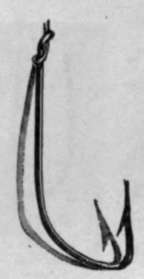The Haddock (Gadus Atglefinus)
Description
This section is from the book "Sea Fishing", by John Bickerdyke. Also available from Amazon: Sea Fishing.
The Haddock (Gadus Atglefinus)
The Haddock (Gadus Atglefinus) is a fish which has given me many a day's enjoyable sport. It is so well known that description hardly seems necessary, though let it be mentioned that fresh out of the sea it is arrayed in lovely shades of lavender and silvery grey, and presents a very beautiful appearance. In Irish waters haddock have been caught which were somewhat remarkable in colouring. One was shown in Belfast market the upper part of which was salmon colour. Then there was a golden-coloured haddock caught near Strangford, while Dublin Bay produced one which was canary-coloured. In size haddock generally run from one to three pounds, but some very large examples have been recorded. Dublin Bay, a noted place for these fish, produced one weighing 24 1/2 lbs., and another of 16 lbs. Couch mentions one of 25 lbs.
Haddock are found mostly on our eastern coasts, and in Scotch waters are a very important item in the products of the fisheries. As a rule they swim in vast shoals, but will suddenly and without apparent reason leave grounds which have been noted for them for many years. Doubtless the explanation is that the food supply has become exhausted. For instance, up to the year 1870 haddock were very plentiful off Mevagissey, in Cornwall, large ones up to twelve pounds in weight sometimes being caught. In that year they left those waters, and are now considered a rare fish.
There is not much doubt that the trawlers have injured the haddock fisheries in many places. According to Pennant, who wrote in 1776, haddock were then so plentiful within a mile of Scarborough Harbour that three men using long lines could often load their cobble with a ton of fish twice a day. But the trawls have changed all that. Trawled haddock, by the way, are mostly cured, being a good deal knocked about. Fish caught by hook and line are infinitely the best for the table; but here I would ask, why in the name of goodness do English people almost invariably plain boil haddocks and serve them with egg sauce ? If there is any sea fish more than another that requires good cooking, it is the one which, according to the legend, St. Peter drew out from the Lake of Genesareth to obtain the tribute money, leaving the mark of his finger and thumb on its shoulders. Parenthetically, the same story is told of the John Dory, which has some peculiar markings ; and, also parenthetically, neither of these fish inhabit the lake.
But, to return to culinary matters, a well-fed haddock freshly caught out of the sea and filleted is by no means bad eating. It may be prepared à la maitre d'hôtel, or egged and bread-crumbed and fried in butter. French cooks, I believe, abjure butter because it is not easy to fry a fish a good colour therein ; but this frying medium gives a sweet nutty flavour which is wanting in fish fried in oil or lard.

Hook For Haddock.
Before you can cook your haddock it is necessary to catch him. As to that there is no great difficulty, for he swims in shoals and is exceedingly voracious. Having found him, fish near the bottom with a paternoster, the hook being about the size illustrated. Bait with mussels or lugworms or a piece of pilchard, sprat, mackerel, or herring, and you will surely catch him if he is at all on the feed. A bait which is deemed great medicine consists of a small piece of squid placed on the shank of the hook, the point being covered with a tempting mussel. This is particularly useful on long lines, where the fish have to hook themselves and are apt to draw the mussel off the hook. The squid remains as a forlorn hope, and often leads to the fish being captured. The man with a rod, who can tell immediately the fish bites, and is accustomed to strike sharply and at the right moment, will catch haddock on mussel solus without any difficulty. I have caught a good many haddocks when baiting my hooks with pieces of grey gurnard.
Continue to:
- prev: The Pout (Gadus Luscus)
- Table of Contents
- next: Hake (Merluccius Vulgaris) And Ling (Molva Vulgaris)
Tags
fishing, hooks, bait, fishermen, spanish mackerel, mackerel fishing
